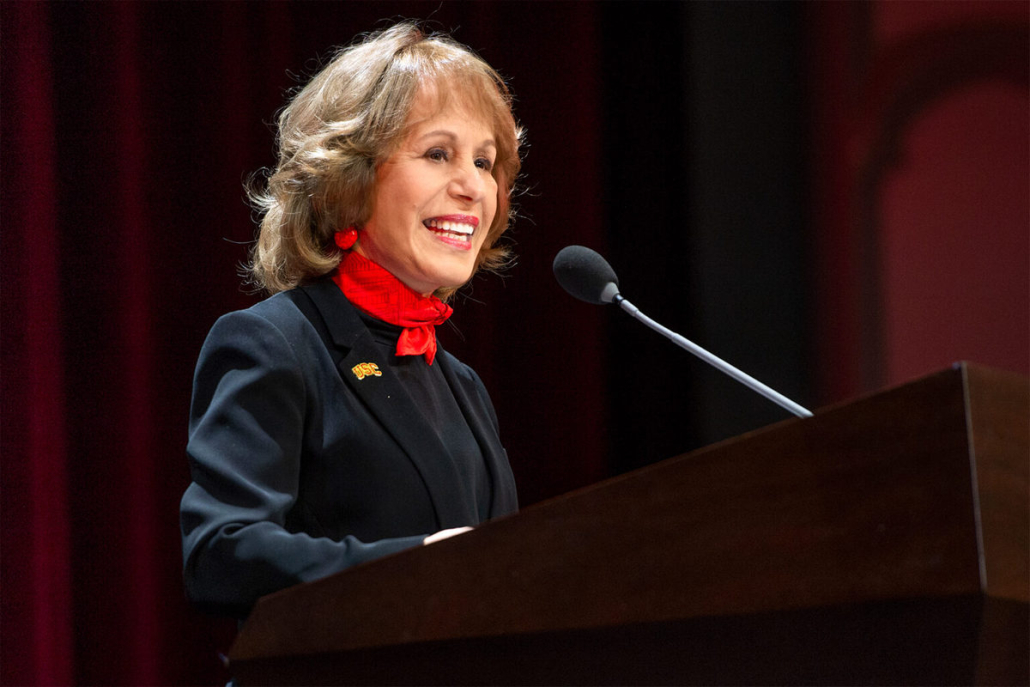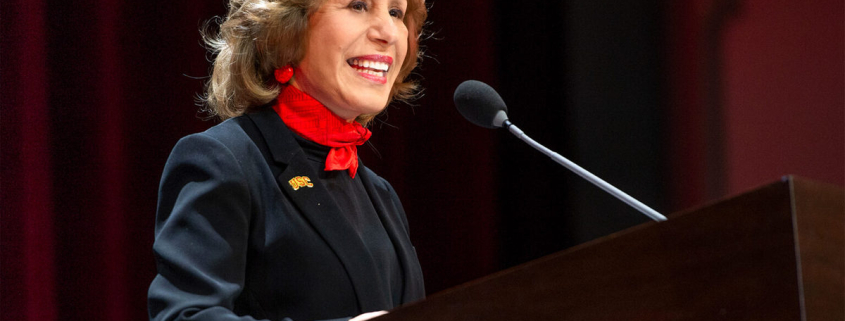Folt talks sustainability and social justice

President Carol Folt spoke on USC’s social justice triumphs — including her response to historical criticism of the University — and the financial progress made in the past year at her third annual State of the University Thursday. Held virtually for the last two years, the hybrid address had more than 50 students, staff and faculty in attendance at Bovard Auditorium, with even more watching online.
Folt began her speech by recounting her visit to the recently opened Nisei Rock Garden, which the University dedicated to the roughly 250 Nisei students who were forced to leave school and imprisoned in American internment camps during World War II. Following the war, former USC President Rufus von Kleinsmid barred the Nisei students from returning to their studies and denied them access to their transcripts.
“These injustices were antithetical to our current dreams, but they were also at complete odds with USC’s founding mission,” Folt said during the address. “Two weeks ago, after 80 years, we acknowledged this injustice by creating this beautiful garden and by awarding posthumous degrees to all the remaining Nisei Trojans who we could locate.”
Folt continued her focus on social justice as she recounted the dedication ceremony for the newly named Dr. Joseph Medicine Crow Center for International and Public Affairs. The building— previously named the Von KleinSmid Center after former University president and known eugenicist von KleinSmid — will now celebrate “Trojan leader” and Native American historian, humanist, musician and educator Medicine Crow.
“[The ceremony] taught me that a powerful way to avoid repeating injustice is by admitting it, remembering it and correcting it,” Folt said. “I want to express my incredible gratitude to legions and decades of students, faculty, staff, alumni in our own Indigenous community, who have been advocating for decades that we uncover both of these truths and make amends.”
Folt also touched on the University’s expanding environmental initiatives, spearheaded by the President’s Working Group on sustainability in research, education and operations, which she launched in 2019. The group’s goals include achieving carbon neutrality by 2025 and a waste-free campus by 2028. As an environmental scientist, Folt said she understands the need for a comprehensive and integrated approach to addressing the climate crisis.
“We’re turning our concern into action, starting right here at home,” Folt said. “For this reason, we truly need to embed a sustainability mindset into everything that we do at USC. No effort is too ambitious or too small.”
Folt then discussed USC achievements made in the past year, starting with the University’s handling of the coronavirus pandemic, such as more than 1 million tests administered and over 250 studies on the impact of the virus.
“Our return to in-person activities is nearly complete,” Folt said. “We successfully ensured the health and safety of the USC community and millions of our fellow Angelenos … USC has been, and continues to be, among the leaders in higher education in terms of our COVID-19 response.”
The University became a member of the “billion-dollar club” for external research funding, Folt said, including a nearly $50 million grant addressing health needs in diverse communities.
“In all of these endeavors, it is really impressive to see how strongly everyone kept pushing their scholarship, their research, their creative work, even under the most trying conditions of the pandemic,” Folt said.
Folt transitioned into her “moonshot goals” for the future of USC. Her first goal, USC Competes, aims to make USC a national leader in accessibility, affordability and belonging by increasing financial aid and investing in the local community. Her second goal, to transform USC’s health sciences, will look to grow investments in medical training and practice.
Another moonshot initiative emphasizes the financial success of the athletics department and its impact on USC students and the Los Angeles community. The final moonshot goal, called the Frontiers of Computing, is a 10-year initiative to accelerate advanced computing research and training in the USC community.
“Sixty-seven percent of today’s workers, it’s calculated, lack the digital skills for their job,” Folt said. “USC certainly can help fill that gap by innovating our academic programs, becoming the largest source of diverse tech talent on the west coast with trust and ethics as a core part of the curriculum that we produce.”
Folt ended her address with a Q&A session, where an attendee asked for Folt to expand on the importance of the recent social initiatives on campus, specifically the renaming of the Dr. Joseph Medicine Crow building.
“Often, these things take years before you realize how it affected you,” said Folt. “But later when you think about points of pride in your University, it’s awfully nice to be excited that we’re one of the first places in America to have a Native American name on a building that is central to our campus.”
When asked to describe the current generation of students on campus in one word, Folt responded with “impatient.”
“If you don’t have impatience, you’re not going to make any change,” she said. “They want to give back. They want to know why and they want to be a part of it … You walk around USC and every student you meet has a very big dream. They truly imagine that they are going to do some really awesome stuff. And that’s a huge positive energy for the community.”

